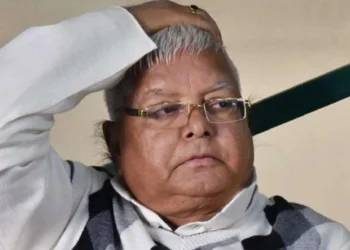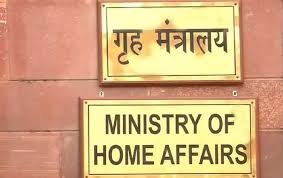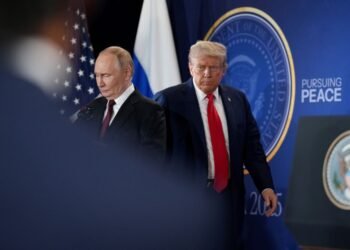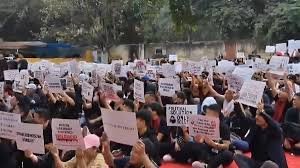Editor’s Note: In observance of the second anniversary of the tragic events that engulfed Manipur on May 3, 2023, The Power Corridors is inviting opinion makers and individuals from all sides of this ongoing crisis to share their suggestions for restoring peace and prosperity to the region. As part of this initiative, we feature a detailed article by Mr. Khuraijam Athouba, Convenor of COCOMI. While acknowledging Mr. Athouba’s contribution, I take the opportunity to encourage other prominent voices within both the Meitei and tribal communities to come forward and express their perspectives. You may send your write-up at novinkn@gmail.com. We intend to compile these contributions and forward the collection to the Ministry of Home Affairs for their consideration of the voices from Ground zero. Thank you. Navin Upadhyay
BY Khuraijam Athouba
The Manipur crisis, which erupted on 3rd May 2023, marks two years of deep turmoil. It began with a well-orchestrated wave of ethnic violence, initiated by Chin-Kuki Narco-Terrorist militant groups under the guise of the so-called Tribal Solidarity March. This has since escalated into an unprecedented humanitarian and security catastrophe. Over 60,000 people have been displaced, nearly 250 lives lost, 32 still missing, and thousands of homes reduced to ashes in targeted attacks aimed at ethnic cleansing. Entire villages, both from Meitei and Kuki civilians, have been devastated. What initially began as internal unrest has grown into a complex network of narco-terrorism, transnational armed groups, and radical separatism, fed by foreign infiltration from Myanmar. The crisis has laid bare the grave failures of both the state and central governments in upholding law and order, protecting lives, and securing the sovereignty of the nation.
The ongoing crisis in Manipur continues to deepen, marked by a glaring discontentment over the inaction of both the state and central governments regarding the 32 cases of enforced disappearances and missing persons reported since the outbreak of violence on 3rd May 2023. Despite repeated appeals from families and civil society organisations, there has been no substantial progress in tracing these individuals. The latest among the tragic list is Mr. Luwangthem Mukhesh, a 20-year-old student from Keishampat, whose disappearance and the custodial death of Khoisnam Sanajaoba recently has sparked widespread outrage across the state. His case underscores the persistent atmosphere of fear and lawlessness that has gripped Manipur. The absence of concrete action in these cases reflects a disturbing pattern of state apathy, where the basic rights to life and security of the people are being systematically eroded. These disappearances are not isolated incidents but are part of a larger scheme of targeted violence, intimidation, and coercion aimed at the indigenous population of Manipur, particularly in the conflict zones bordering the valley and hills.
The Responsibilities of the Government of India
First and foremost, the Government of India must ensure the enforcement of the rule of law across the entire state of Manipur. Even today, lawlessness prevails, particularly in the hill areas where armed militants operate with impunity. Armed Chin-Kuki narco-terrorist militants have been brazenly attacking villages such as Churachandpur, Kangpokpi, and Moreh, using sophisticated weapons. There can be no partial authority; the state must exercise its power uniformly across both the valley and the hills, guaranteeing the safety of all citizens and the protection of their lives and properties.
Secondly, there is an urgent need to neutralize the hostile elements entrenched in the hill districts. Following the initial attacks, especially in places like Moreh in September 2023 where militants deployed drones and heavy weaponry, it has become clear that post-SoO (Suspension of Operations) militants have fortified their positions. The regrouping of these militants, allegedly aided by safe havens and Indian Govt.’s support, poses a direct threat to the State’s internal security. Comprehensive counter-insurgency operations are indispensable to reclaim control over these hostile territories, but the deceiving pact between the Govt. of India and SoO groups has shielded them from any possible actions.
ALSO READ: Key Thadou and Meitei Groups Unite, Demand NRC in Manipur
Third, the Government of India must immediately abrogate the Suspension of Operations agreement. Signed in 2008 with the hope of fostering dialogue, the SoO has now been grossly abused by militants as a cover to regroup, rearm, and launch attacks. Concrete evidence shows militants, armed with weapons smuggled from Myanmar, leading brutal offensives post-May 2023. Foreign mercenaries, particularly from the Zomi Revolutionary Army (ZRA) and Kuki National Army (KNA) of Myanmar, have embedded themselves within Manipur’s insurgent groups under the umbrella of this agreement. This arrangement can no longer be justified. Furthermore, it is imperative to identify and prosecute the foreign-origin terrorist leaders orchestrating violence in Manipur. Myanmar-based insurgents, primarily from the Chin-Kuki groups, have assumed command roles within militant operations inside the state. Notably, in October 2023, a Myanmar national was apprehended for direct involvement in armed conflict within Manipur. These actors are deeply entrenched in narco-terrorism and transnational arms smuggling. The government must launch targeted operations to dismantle these foreign networks and restore Manipur’s integrity. The Govt. of India must stop aiding and protecting foreign mercenary terrorist leaders like Thanglianpau Guite, Chairman ZRO/ZRA, and PS Haokip, President, KNO/KNA, in the name of a proxy peace pact called the Suspension of Operation Agreement 2008.
Securing Manipur’s highways and lifelines is another critical responsibility. The frequent blockades of NH-2 and NH-37 by armed groups have paralyzed supply routes, cutting off essential goods and medicines to the valley. Despite Union Home Minister Amit Shah’s assurance on 8 March 2025 of keeping the highways open, renewed blockades with open defiance and challenges persist with no legal action against those responsible groups and leaders. Ensuring free, safe passage along these routes is non-negotiable for 1.5 million population humanitarian access and the survival of displaced civilians.
Equally important is holding accountable those who blatantly defy peace initiatives. Despite public appeals by the Union Home Minister and the Governor of Manipur, armed groups and CSO groups continue to challenge state authority. Illegal check-posts, extortion, and territorial occupations persist, especially around Moreh, Churachandpur, and Kangpokpi. These actions are outright criminal violations and must be dealt with under the strict provisions of the law. The Government must also enforce the surrender of illegal arms. Despite directives from the Ministry of Home Affairs on 28 September 2023, militant groups have refused to disarm. Videos have surfaced showing armed militants celebrating attacks, openly brandishing illegal weapons. A thorough and uncompromising disarmament drive is essential to restoring civilian safety and public order.
ALSO READ: KIIT Under Scrutiny After Second Suicide of a Nepali Student
Additionally, the government must acknowledge and address the root causes of this crisis. The unchecked influx of illegal immigrants from Myanmar, especially the Chin-Kuki groups settling along sensitive border areas, has dangerously altered the demographic balance. Intelligence reports indicate that over 5,457 illegal immigrants have crossed into Manipur since the military coup in Myanmar in 2021. The booming narco-terror economy is financing arms, supplies, and separatist propaganda, including the extremist “Zalengam” and “Kukiland” agendas. This expansionist threat, akin to the doctrine of “Lebensraum,” must be decisively countered to protect the integrity of Manipur.
It is equally necessary to engage directly with the leadership of SoO groups. Chin-Kuki leadership, including elected MLAs and MPs, have publicly acknowledged that SoO leaders exercise supreme control over their political and security decisions. For instance, members of the Kuki People’s Alliance, in statements made in December 2024, openly demanded a separate administration for Kuki territories. Without holding these leaders accountable, no meaningful dialogue or restoration of peace can proceed. Finally, to restore public confidence, the imposition of President’s Rule under Article 356 is warranted, yet President’s Rule failed again as it lacks sincerity in dealing with the actual causes of the Crisis. Transparent, accountable, and decisive governance is the need of the hour.
Conclusion: The Path to Peace
The Manipur crisis is not an isolated ethnic clash; it is a grave national security emergency. Under Article 355, the Union Government holds the constitutional duty to safeguard the state against external aggression and internal disturbances. Urgent priority actions include the abrogation of the SoO agreement, neutralization of militants, restoration of highways and supply lines, prosecution of defiant actors, and the complete disarmament of illegal armed groups. Only after restoring security and the rule of law should dialogue processes begin, focusing on peaceful, law-abiding citizens from the Chin-Kuki-Mizo-Zomi-Hmar communities.
These dialogues must be free from the shadow of militant coercion and guided by the principles of rehabilitation and integration. The restoration of law, order, and sovereignty must precede reconciliation. Abandoning the Constitutional and Fundamental Rights of the 3 million population of Manipur by the Govt. of India is considered a gross human rights violation and a grave humanitarian crisis which must end soon.
The people of Manipur deserve lasting peace, justice, and security.















